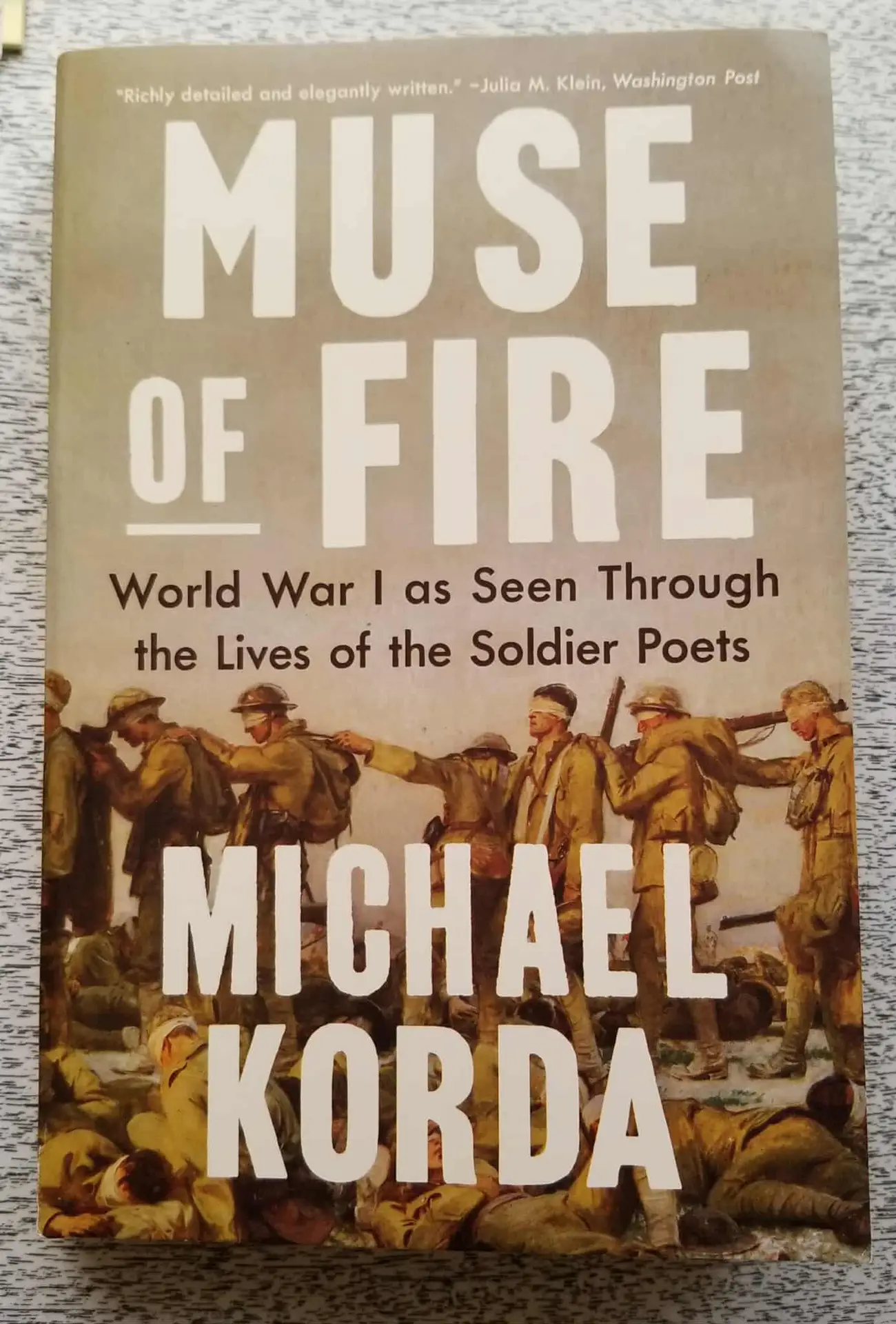
- Title: Muse of Fire
- Author: Michael Korda
- Genre/Subject: WWI War Poets biography
- Publisher: Liveright
- Publication Date: 2025
- Start date: 4/2/25
- Finish date: 4/15/25
Review:
First completed read of 2025 and we’re 4 months in! And this book was well worth the wait. As the subtitle indicates this book is a a history of WWI as seen through the the eyes and the lives of the soldier poets, or as they are often remembered, the War Poets.
Why I have never heard of this author remains a mystery but I am certainly glad I did. Korda writes history but not the boring history you remember from school. The book is what they call nowadays narrative history meaning it reads more like a novel than a textbook. This does not mean it is short on facts, not by any stretch. It simply means that the narrative drags you in and keeps you engaged the whole way through.
The book begins with a chapter aptly titled Halcyon Days and we are taken to the year 1911 with a young man named Rupert Brooke and his companions camping under canvas in the bucolic English countryside. The companions read like a who’s who of Edwardian England: Lytton Strachey, Virginia Stephens who would be better known as Virginia Woolf after marriage, Maynard Keynes the future economist, and the Olivier sisters who were noted at the time for their beauty and later would be known as the forebears of Laurence Olivier. The Edwardian period is often thought of as England’s gilded age and this chapter offers a unique look inside the middle class experience of that age. Lots of poetry, lots of impassioned letter writing and of course plenty of tramping about on England’s green and pleasant.
And then…that all changed in 1914 as we all know with our perfect hindsight. One thing to mention is that none of the poets and soldiers that we meet here had any idea that this war was coming and certainly none had any idea of the scope and extent of what would be called the Great War. This actually makes sense from an English perspective as the channel gave them not just physical but also political distance from continental Europe. Germany and France and the other major and minor players all had conscription and huge standing armies while England had a small defense force of career soldiers and of course their vaunted navy. The continental armies knew something was coming, but even the most experienced members of the governments and military commands were shocked at the speed with which the events unfolded that would lead to the war.
The book follows the lives of five men who would be called by later generations the soldier poets. To understand the significance of this it is important to know that prior to the war poetry was the purview of poets, much as books were the responsibility of writers. In other words professional poetry made by people whose sole occupation was to do just that, write and publish poems. Due to the rigid class structure in place the idea of a soldier or a sailor or indeed a candlestick maker producing verses was simply not considered. Prior to 1914 war was waged by professional soldiers against other professional soldiers. By the end of the war every single life and every single occupation was busily engaged in killing and waging war on everybody else, poets being no exception.
The narrative also follows the change in tone of the poetry as the war progressed, as the dreamy hope and glory poems of Rupert Brooke were slowly replaced by the skeptical tone of men writing after having experienced war first hand for much longer than anyone had imagined. And from there the poems proceeded to become more and more disillusioned until ending up with Wilfrid Owen’s famous question “What passing bells for those who die as cattle?”
The narrative takes the reader effortlessly from the Halcyon Days of Bourgeois English comfort to the shattered world and broken dreams that were all that was left in 1918. There is no sense of optimism, no hope, no false patriotism in the narrative, unlike what the soldier poets themselves would experience as the war machine drove the propaganda machine.
What the soldier poets gave the world was not hope, not thrills, not martial spirit, but simply the truth. The truth as they experienced it in the mud and the stench and the piles of rotting corpses. Some of the descriptions, well. I had to put the book down sometimes as to put it simply there was no way we can imagine their experience. But this book was a great experience, and despite the horrors it did give me hope. Hope for the future and hope that we can learn from the mistakes of the past. I don’t hold out a lot of hope, but I do hold on to some.
I highly recommend this book not just to history readers but to anyone that has an eye on current events. Those who fail to learn from history are doomed to repeat it, and this continues to be true. My hope is that enough of us can read and learn and make a difference. Start by reading and learning, and this book is a good place to start the journey.
I award this extraordinary book the distinction of the coveted Neilosian Five Stars and I hope you all enjoy it as much as I did.
This book made me want to: Build more great war dioramas.
Overall rating: ![]()
![]()
![]()
![]()
![]()
Readability: ![]()
![]()
![]()
![]()
![]()
Plot: ![]()
![]()
![]()
![]()
![]()
Other: ![]()
![]()
![]()
![]()
![]() That picture of Rupert Brooke in his theater costume. Tell me you’re gay without telling me you’re gay.
That picture of Rupert Brooke in his theater costume. Tell me you’re gay without telling me you’re gay.

